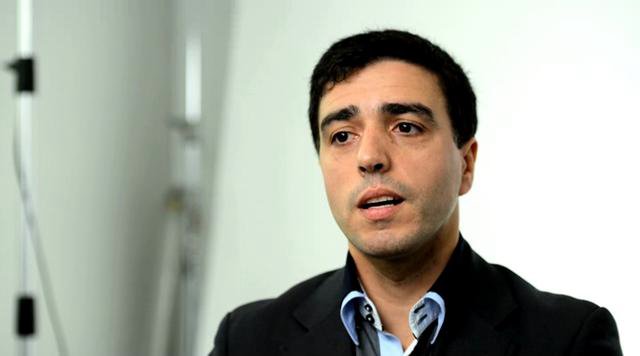
We had a chat with Nuno Sebastião, founder and CEO of Feedzai, the Portuguese startup working on fraud protection who has just raised 17.5 million dollars! Nuno will be one of our speakers at #LIS15 – Lisbon Investment Summit so here’s sneak peek of what you can expect from his talk… From moving to San Francisco and reaching American VCs to scaling a startup, Nuno shares bits and pieces of the story behind Feedzai to all those who are currently building a startup. We’re pretty sure that after reading this you’ll definitely want to talk to him at #LIS15 this Thursday, so don’t let this chance go to waste…
Feedzai was born in Portugal and since the beginning you’ve had people working remotely, in different cities and now countries. How and why did that happen?
Feedzai started off in Coimbra at IPN, but I actually stayed in Lisbon because I had one requirement: I had to be 30 minutes away from an airport. So our team kind of learned how to work remotely since the very beginning. It’s easier for hiring purposes too, you have people who don’t want to leave their cities so we have to adapt. We currently have people in Porto, Coimbra, Lisbon and in the US: in the Bay Area and also in the East Coast because our customers from the financial sector are mostly in the East Coast. For us, this makes total sense to have the team spread out. We basically live in HipChat and honestly working remotely it’s a matter of habit.
You have recently raised a round of 17.5 million dollars. Have you got any advice for other startups who are currently raising investment?
Honestly, it’s pure hard work. This investment is the result of really hard work from our team, otherwise none of it would be possible. It doesn’t matter if you’re Portuguese, Spanish or American, that’s irrelevant, what really matters is to get moving and leave the comfort zone. In our case, we had to sell our product and technology in the US. We had a disruptive technology and a cool product, but none of it would have the same impact if you had not moved to the US. Yes, we were a bit naive initially but we set out to sell this technology to the largest banks and corporations in the US.
When you’re abroad and especially here in the US if you’re confident and if you believe in what you do people will talk to you and give you a shot. You might only have 30 minutes, but they give you an opportunity. For this reason, you need to prepare your pitch so that you can prove you’ll add value to that company in just 30 minutes. It should be fact based and not just a conversation. It takes some time, but you’ll get there. For us, it was almost 2 years until we had customers that paid us millions of dollars per year, but we made it. And for all this to happen you need to be persistent.
Was going to the US the turning point for Feedzai?
Yes. I think that the turning point was when we closed the round of investment in 2013 with Sapphire Ventures. They gave us 2 million dollars but under the condition that I had to go and sell it in the US. At the time, I didn’t know anyone in the financial sector but I had to do something about it. My advice is for entrepreneurs to knock on people’s doors, go to events and learn all about it. In less than 2 years, we went from not knowing any events to being invited to talk at these events. But it’s a lot of work. Sometimes I spend 2 nights a week in an airplane, I’m always traveling around. But in the end If you have the right attitude and work really hard the results will come.
Pretty much, all your customers in the financial sector are in the East Coast but you spend a lot of time in San Francisco. Why is that?
Well, because we need to be in the Bay Area. Even though most of our customers are in the East Coast they all come to the Bay Area. We’re not yet known so for us to reach these big companies we usually go through the technology approach. All these big corporations and banks have startup labs and innovation centers in San Francisco. So we need to balance it. We sell in the East Coast, but we have the Silicon Valley DNA. However, during this past year things have changed a bit. We now have a much stronger startup ecosystem in New York for example. Nonetheless, it’s important to be in San Francisco for all the tech talent. You have people here with years of experience in product management and development while in the East Coast you have more business and sales.
How were you able to raise with international investors? How did you get to them?
For the previous round, I met the managing partner of Foundation Capital at an event and he really liked our story. In the end he said: ’I like your story so I’m going to do something for you, give me your email and a sentence describing what your company does and I’ll help you’. He ended up sending more than 20 emails to VCs in the Bay Area. This was awesome because with this intro I was able to schedule several meetings with VCs. It was really tough to attend all these meetings. I got several No’s for obvious reasons. First of all I wasn’t American and then I had no customers in the US. But in the end, from the 20 VCs I spoke to, 2 of them said yes and that was it, we closed the deal.
It was really fast because here in the US there’s a lot of competition between VCs. Getting the intro from an important player was crucial because all of the VCs knew that he sent that email to several investors so they had to act upon it.
What about the Series B you just closed? Was it a similar process?
Oh no, that was completely different. For this round of investment, we had several offers on the table from top VCs but we had to think strategically. It was more than just the money, we needed investors to advise and help us. So for our sector, which is Fintech, OAK HC/FT was the best possible match. We initially spoke to Jonathan Weiner, who is a Venture Partner at Oak, because he had a connection to Espírito Santo Ventures. Jonathan sold his company to Google for a large amount of money, that is not officially disclosed, but it’s on the top ten of Google’s acquisitions so you can imagine the numbers. He’s also the organizer of the biggest fintech event in the US called Money2020, so no wonder that this was a perfect match for us.
So basically what you’re saying is that you shouldn’t just take the first offer on table, right?
Yes and that is a common thought amongst entrepreneurs. There’s so much pressure to raise investment that your instinct is to take the first offer you get. However, it’s really important to choose the right partner. Especially when it’s later stage, when you’re scaling and growing. For us the goal was to choose the partner who could offer us the experience and insights we needed. So from October until March all I did was work on fundraising, meet the VCs by talking to everyone, seeing how they work and what they could do for us. We were putting them to work, basically. When you reach a certain level this is what you need to do. The VCs need to prove they’re the right fit for you because we’re giving away part of your company and that is a big cost. So in the end our conclusion was that these guys from Oak were really good in the financial sector and I knew Jonathan already which was also a big advantage. With Oak we knew we had the connection to key players we needed in Fintech.
And now what’s next? What are your future plans for Feedzai?
Well, we end up wearing different hats as the company grows. Until now it was just hustling, hustling, hustling, so that we could close as many deals as possible. Now, our focus is much more on setting up operations. We now have huge companies working with us so we need to provide the support and customer care they need. So in the end this round of investment is for us to be able to guarantee this kind of support. It’s not just about the technology anymore, it’s about having a support that is 24/7 and about cracking the machine. We have found the repeatable sales model so now we need to build the team and set up the structure. It’s not just about the technological challenge anymore, it’s more sales and business. We need to sell this in different countries.
Just to give you an idea from the 50 people we now have in our team, only 2 of them are sales. So it’s pretty clear that we need to ramp this up.
As for the long term, if the markets remain positive and if we keep working hard there’s a clear, but obviously long, path to take Feedzai to the public markets. But regardless of our final goal, there’s still a very long way to go.
Did this story caught your attention? Then, don’t miss the chance of talking to Nuno Sebastião and many other interesting entrepreneurs and investors at #LIS15 – Lisbon Investment Summit this Thursday and Friday. Get your ticket here before they sell out!
The post Nuno Sebastião – How to Raise Money With American VCs appeared first on Lisbon Summit.

